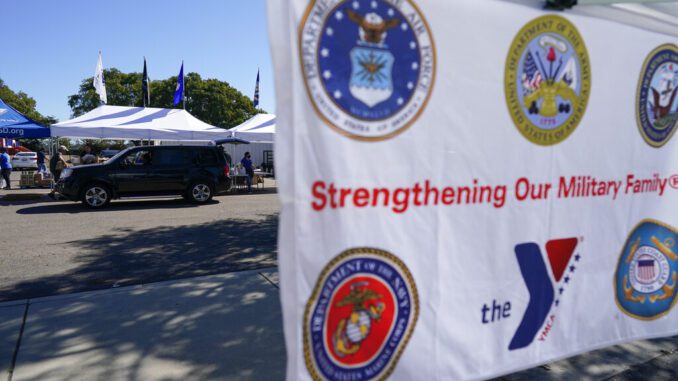
SAN DIEGO — It’s a hidden crisis that has existed for years inside one of the most well-funded institutions on the planet and has only worsened during the coronavirus pandemic. As many as 160,000 active-duty military members are having trouble feeding their families.
That estimate by Feeding America, which coordinates the work of more than 200 food banks around the country, underscores how long-term food insecurity has extended into every aspect of American life, including the military.
The exact scope of the problem is a topic of debate, due to a lack of formal study. But activists say it has existed for years and primarily affects junior-level enlisted service members — ranks E1 to E4 in military parlance — with children.
The group estimates that 29% of troops in the most junior enlisted ranks faced food insecurity during the previous year.
“It is what it is,” said James Bohannon, 34, a Naval E4 (petty officer third class) in San Diego who relies on food assistance to keep his two daughters fed.”You know what you’re signing up for in the military, but I’m not going to lie. It’s really tough.”
In addition to modest pay for junior enlisted ranks, the frequent moves inherent to military life make it difficult for military spouses to find steady work. Also, the internal military culture of self-sufficiency leaves many reluctant to speak about their difficulties, for fear they will be regarded as irresponsible.
The problem is exacerbated by an obscure Agriculture Department rule that prevents thousands of needy military families from accessing the SNAP government assistance program, commonly known as food stamps.
“It’s one of these things that the American people don’t know about, but it’s a matter of course among military members. We know this,” said Sen. Tammy Duckworth, an Illinois Democrat and former Blackhawk pilot who lost both legs in a helicopter crash in Iraq. “We’re the mightiest military on the face of the earth and yet those who are on the lower rung of our military ranks are — if they are married and have a child or two– they’re hungry. How can you focus on carrying out the mission and defending our democracy. If you’re worried about whether or not your kid gets dinner tonight?”
Perhaps the best indication of how entrenched the problem has become is that a robust network of military-adjacent charitable organizations such as the Armed Services YMCA and Blue Star Families has developed an infrastructure of food banks near most major domestic bases.
San Diego may be one of the epicenters of the phenomenon, with high housing costs and multiple military bases within driving distance. For Brooklyn Pittman, whose husband, Matthew, is in the Navy, the move to California from West Virginia this year was a financial shock.
“We had a nice savings built up and then we moved out here and it was rough,” she said. “We still had student loans and everything on top of everything else.”
Their savings quickly disappeared and the small income she earns from dog-sitting didn’t come close to covering the shortfall. For a while, the couple considered sleeping in their car on the base grounds until the next paycheck.



